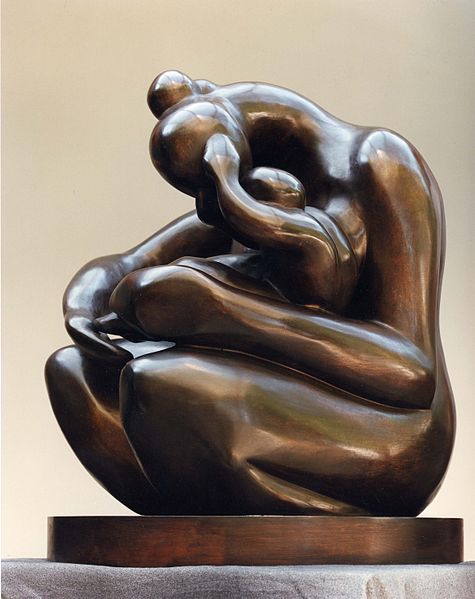by guest writer Deborah Gober Alvarenga
This piece was originally published in the Houston Chronicle on Sunday, July 14th: Forget politics. Go to the border. Hold a child. [Opinion]
Politics aside, let’s talk about the border situation. That’s challenging these days, so let me see if I can help. You see, I’m not a Democrat or a Republican. First and foremost, I am a Catholic. I believe that Jesus’ teachings should inform my politics and not vice versa. I work in ministry, so my daily mantra is Matthew 25:35. I am far from perfect, but I aim to follow Jesus every day and practice the corporal works of mercy. That is my job and it is my life. For the most part, I feel disenfranchised in today’s polarized political climate, so I try to ignore politics as much as possible and focus on the work that Jesus wants me to do (be in this world, but not of this world). Of course, I fall short of that every day. Posturing, shouting, pointing fingers, and angry rhetoric abounds in today’s world and it’s hard to tune out all of the noise, so that we can focus on what really matters.
Last month, my husband and I volunteered at a temporary shelter for migrants at the border. It was a powerful experience–both physically and emotionally taxing. In the 106 degree heat (118 with the heat index!), my husband laid the foundation for a storage shed for all of the donations coming in, while I cooked, cleaned, and sorted donations. But, we also listened. We listened to stories of hardship and suffering. We played with children and comforted crying babies. As I held an 11 month-old child in my arms until he stopped crying, I was struck by a very simple thought. In a world full of vitriol, what if everyone was able to hold a migrant child–hear that child’s cry, feel the sobs racking his whole body, comfort him until the crying ceased, feel his breathing slow to match yours until he relaxes against you, and then feel him cling to you for dear life when you try to let him go?
My heart had melted. Who wouldn’t feel the same, I wondered. With a heart full of compassion and love, there’s no room left for anger or fear. The color of the child’s skin doesn’t matter. It makes no difference that his name is Miguel, not Michael, or that he wasn’t born on the U.S. side of the river. He was scared and traumatized, but now he’s sleeping peacefully against your shoulder. It is such a small thing, but at the same time, it is beautiful and almost miraculous. We are indeed “wonderfully made” in such a way that a simple hug can change so much.
I realize that this may all sound incredibly simplistic and naïve. I know that it doesn’t present a solution to our very real border crisis nor does it solve the legitimate problems within our immigration system. Nevertheless, I’m reminded of the scene in “To Kill a Mockingbird” when young Scout manages to break up an angry mob that is intent on lynching an innocent Black man. Simply by singling one of them out and speaking to him personally, Scout inadvertently shatters their “mob mentality” and humanizes them. No longer anonymous, the individuals within the mob are ashamed of their actions. Scout’s father Atticus later muses that “A mob’s always made up of people, no matter what… it took an eight-year-old child to bring them to their senses.”
Social media can easily fan the flames of that kind of “mob mentality.” Oftentimes on social media, the loudest and most strident voices attract the most attention, while the anonymous nature of social media can encourage and feed the rage of those who feel disaffected or victimized in some way. We are quick to anger these days and even turn upon other Christians in defense of our political tribe. Politics becomes theater where hysteria and outrage command our attention. As the political tribes and media pundits clamor for our attention in this high-charged environment, it’s hard to separate truth from fiction and know what to believe. Amidst all of this sound and fury, it’s easy to lose track of some of the core teachings of our faith. We must remember to be still and listen for the voice of God. Even in politics, He is with us if we just slow down and look for Him.
As Christians, we cannot allow ourselves to be led astray by angry mobs or tribal politics. The scriptures have much to teach us about immigration and welcoming the stranger. As Catholics, we believe in the sanctity of life, and we know that Jesus identified with and showed a marked preference for people in need, especially the sick, the poor, and the marginalized. Throughout both the Old and New Testaments, there are countless references to migrants (translated into English in a variety of ways in different verses as strangers, sojourners, aliens, foreigners, and outsiders). There is much food for thought about immigration within the scriptures. Many would probably be surprised to find out how important the treatment of migrants has been to the heart of God and the people of God throughout history. For Catholics who are well versed in the political rhetoric surrounding the current immigration crisis at the border, perhaps it is time to tune out the noise and reflect upon what scripture and the Church teach us about immigration instead.
Personal involvement, volunteer experience, and conversations with migrants can also help us to truly understand what’s happening at the border now. Why should we believe what the Right or the Left or the media tells us about migrants when we can find out for ourselves? Let us replace the angry rhetoric and misleading stereotypes with real personal experience and encounters. Catholic shelters all along the border are in desperate need of our help. There are children out there who need clean clothes, a nutritious meal, and maybe even a small toy. There are babies who need diapers and formula. Donations are certainly needed, but perhaps beyond all of that, these children need to see friendly faces and smiles, hear laughter again, and experience the comfort of a hug. Please ask yourself if this is something that you can give to a child for just a few hours or a few days.
It may not be the same thing, but for those not able to venture to the border for whatever reason, I would recommend this: Hold your own child or grandchild close for a moment and imagine how you would feel if she was separated from you and left to fend for herself in a freezing concrete cell (referred to as “iceboxes” by the migrants we met) without blankets, showers, clean clothes, nutritious food, and comfort. Try to refrain from laying blame on the parents for crossing the border illegally (although all the migrants we met were claiming asylum which is a legal right) or endangering their children (although those we spoke with wanted their children to be safe from the violence at home and have an opportunity for a better life). Regardless of how you interpret the actions of the parents, reflect upon all of the wrong turns you’ve made in your life and how you wouldn’t want your children to suffer or be punished because of your mistakes. Still holding your child, give thanks to God that she has the opportunity to play and go to school. Thank God that she is safe, clean, and well-fed. Pray that your child will remain so and that if she is ever separated from you, kind strangers will comfort and care for her. Then, please pray intently for all of the many children held in U.S. detention facilities who are cold, dirty, hungry, and in need of comfort right now.
Our world today has become so polarized that it almost seems as if we will never be able to find common ground again. Perhaps we need the migrant children to soften our hearts, heal our divided “mobs” or tribes, and unify us as Catholics and as Americans. We may find that we have something in common after all. Regardless of political tribe, we can unite behind our humanity, compassion, and most importantly, our Catholic faith.
For information on volunteering at the Border:
Call Catholic Charities of the Diocese of Laredo at #956-722-2443 or contact Catholic Charities of the Rio Grande Valley at http://www.catholiccharitiesrgv.org/volunteer.aspx. If you would like to send donations, please check first to see what their immediate needs are before sending anything.
About the Author: Deborah holds a Bachelor’s degree in Psychology and a Master’s degree in Cultural Anthropology. She is a ministry leader and missionary.
image credit: commons.wikimedia.org/wiki/File:Mother_Embracing_Child,_bronze,_1988,_21″,_Lowe_Art_Museum,_Miami,_FL.jpg

















